The next thing you must do is crate train. This will help with house breaking, make it easier to travel with your pup, and make him more comfortable if you must ever leave him at the vet's or a kennel. The crate should be just large enough for the pup to stand up and turn around, any larger and he may use one end for potty and the other for sleeping. There are crates available now that have "transition" panels in them, allowing you to buy a full-sized crate and use the panels to section them off as the pup grows.
Potty time needs to happen after every meal, nap and play session, and usually about every 2 hours or so in between - get on a schedule (and adjust as necessary) and this will speed things up. A pup as young as [9 weeks] can't be expected to hold it for more than 3-4 hours at this stage - so that also means getting up in the middle of the night for a few weeks. If you're lucky, you'll get one like my female, who slept through the night from the age of 10 weeks, if unlucky, you'll have one like my male who had to get up even at 5 mos old. It's important that you take the pup out for potty when he needs to go, the last thing you want is a pup that learns to potty in his crate because he had no other choice - trust me, it's a very difficult habit to break. If you're pup makes a mistake, you're not paying enough attention to his needs - and need to potty him more often.
When you do potty your pup, please use a leash - there's nothing worse than a dog that is leash shy and won't potty on leash. Take lots of yummy treats and give the pup a treat every time he goes - throw him a little party. Give a command, like "go pee", too - this will eventually let your pup know that he is out there for potty time, not play and look at the sky time. This will also come in handy as your dog grows - trust me, when you're at a hotel and it's pouring down rain, it's a very handy tool to have - when I travel with my two, I can point them at a spot, say "go pee" and get a potty within seconds usually (if they really do have to go).
Do yourself a favor and buy a gallon of a really good enzymatic cleaner - I like Nature's Miracle. If you're pup makes a mistake and you don't catch him in the act, simply take him, put him in his crate and clean up - don't let him see you cleaning up. If you catch him in the act, often a sharp "no" will stop it in mid stream, you can then scoop him up and take him outside, be sure to praise lavishly when he finishes up outside.
If you take him out and he doesn't go, put him back in his crate for about 20 mins and then try again - repeat as necessary. He doesn't get play time until after he's gone outside.
Keep playtime indoors for now - until he is mostly housebroken. You want him to associate outside with potty time, not play time, or play in a different part of the yard. Also, always potty him in the same area of the yard, the smells will remind him why he's out there.
Get yourselves enrolled in a puppy class - the best time to socialize your pup is now. The safest way to do that is in a class where you know all the pups have been inoculated and it is a controlled environment.
DO NOT allow your pup to interact or talk to strange adult dogs. Do not be fooled by what some people call "puppy license" that states that pups in a pack are allowed certain liberties that older dogs would not have. Although this theory is true, it only applies to the pup's own pack. In the "real" world, pups from other packs are considered a threat to the survival of another pack - and in most cases, adults would kill pups not from their own pack. Although our dogs are not wolves, those instincts are still ingrained in them - it is not at all unusual for an adult dog to attack or kill a puppy (especially in-tact males). So unless you know the dog, please keep your puppy away and safe. DO NOT take this pup to places that are frequented by large amounts of dogs until he has received his final shots - taking a pup to dog parks and public parks endangers his life until full immunity to diseases has been reached, and this is not until after 16 weeks.
If you go to places like PetSmart or PetCo - they are great places to socialize your dog with people, but please, leave the pup in the cart, do NOT allow him on the floor in these places, it's WAY too dangerous to your pup's health.
FYI - pups go through what are called fear imprint stages. Things that frighten a pup during these stages will most certainly always frighten your pup. For example, if the pup is bitten by another dog during one of these stages, you pup will most likely either be dog aggressive or dog fearful for the rest of his life. It is critical that all experiences be positive until about the age of 6mos - by then, most dogs have gone through all their fear imprint stages and traumas are usually then better dealt with.
I want you to imagine yourself alone, in a strange country, where they don't speak your language and you don't know the laws and customs. Then imagine how stressed and uncomfortable you would be. Well, this is what it's like to be a puppy in a human world. In order to make your pup comfortable in this new world, you must think (and speak) like another pack member. It is very important that you be consistent with this pup, decide on what rules you want this pup to adhere to, and then always enforce these rules. It will help your pup adjust and be comfortable in his environment. For example, you can't say - yes you can get on the furniture, unless you're muddy. Or yes, you can have this table scrap today, but not when there's company in the house. Either they can get on the furniture or they can't, they can sit by the table or they can't - decide on how you want things (keeping in mind that the adorable pup you now have will grow to an 80lb+ fuzzball in just a short year), and then stick to those rules - enforce your rules fairly and consistently and you will never have a problem with your pup.
Practice "nothing is off limits" and "nothing is free". In other words, you are allowed to touch or hold any parts of your dog, teeth, ears, privates, etc. It is very important that you desensitize your pup to touch of all types, at any time (including feeding time). You never know when an uneducated person may come up and try to pet your dog either the wrong way or at the wrong time. Just this past weekend, my female was gnawing on a particularly yummy knuckle bone in a public venue - I watched a small child walk by and pet her as he passed - many dogs would react aggressively to someone touching them while they were eating, but I knew it was safe because I have conditioned my dogs to accept touch at any time. I had another stranger that was interested in my breed of dog ask what would happen if she took the bone from my dog (she had kids at home and wanted to know if they were safe around kids). I told her to take the bone - my female gave this stranger the bone without even a second thought and waited patiently until the stranger gave it back to her. Again, I knew there was no danger in this because I've conditioned my dogs to accept this. Toes are a particularly tough area on many dogs - you will never have a problem with toenails if you massage then daily now, while the pup is young. "Nothing is Free" has to do with resources. You establish yourself as pack leader by controlling resources - make your pup work for everything, outside, play, food - and work can be as simple as asking the pup to sit or wait for that resource.
Your pup will never chew anything if you never give him the opportunity. If it's within reach assume the pup will try it out. The pup must not ever be out of your sight, he either needs to be with you or confined to a crate. Set your pup up for success, by giving him a safe environment to play in - don't leave your shoes around, put them in a closet and close the door. The only thing in pup's reach should be his own things. The worse chewing stage happens between 5 and 7 mos, so don't be lulled into a false confidence when your pup is a perfect angel for the first few months. If your pup gets into something, learn from YOUR mistake - a dog that gets into trouble has too much freedom.
When teaching commands such as "come" again, set your pup up for success - do not use the command until the pup is already coming to you - you can use other things to get his attention, like clapping hands, a squeaky toy, etc. and when the pup does come, praise lavishly and treat liberally. Don't repeat your commands - trust me, a dog will learn to tune you out, or they will count how many times you say it before you actually do something about it. When teaching a recall, it's very important that the pup never has the opportunity to disobey - use a drag line (a piece of clothesline tied to the pup) and if he ignores you, step on the leash and draw him towards you, rewarding when he gets to you. NEVER call your dog to you and then correct him - that is the fastest way to create fear in a dog and create a dog that won't come to you. If for some reason you need to correct a dog - always go to them, not the other way around.
Feeding is another important thing. Pick a good quality food (don't be drawn in by "designer" foods either - read the label and make an educated decision). Once you've picked a food - stick with the food. Changes in food will create picky eaters and cause digestive upset. Put the food down for 20 mins, if it's not eaten, pick it back up and wait until the next scheduled feeding time. Males are notoriously bad eaters - don't worry, they won't starve themselves. If your pup is distracted at feeding times, you may want to feed in his crate. Do not add things to the food (like canned food or gravy) - this too will cause a picky eater.
Unfortunately, pups don't come pre-programmed to understand us, they also don't come with instruction manuals. The very best thing you can do for you and your pup is getting involved in an obedience program, and stick to it at least for the first year, my two are 2 and 3 and still attend classes weekly.
Most importantly, have fun and enjoy - it's a lot of work, but that work will really pay off down the road when you have the unconditional love and companionship of a well adjusted dog.
[Escrito por Denise Parsons em 27 de janeiro de 2006 para a lista Petdogs-L do Yahoo Groups]
The seconds stage of housetraining is teaching your puppy to tell you when he has to go outside to potty. Bells are one way to do it but it's not my favorite method. I've had a lot of students who did not like the constant ringing that some dogs do when they just want to go outside to bark at the wind...or they just like to hear the bells ring. It can turn into a game. So, although it works well for some, for many it does not. It's a personal choice.
Denise wrote: "Keep playtime indoors for now - until he is mostly housebroken. You want him to associate outside with potty time, not play time, or play in a different part of the yard. Also, always potty him in the same area of the yard, the smells will remind him why he's out there."
I don't agree with this. I do teach that they have to potty before playing but to say that one isn't going to let their puppy play outside until they have mostly (or close to) being housetrained would be quite awhile for the average puppy. Some puppies take up to a year before they are 100%. Lots of good games and training can and should be happening outside. The puppies need to explore the world around them. As long as you don't allow play before they potty, they will make the association. I do tell them outside-hurry-up (or whatever word you choose to use for potty) all the way outside so that the association is made to going potty and that they can learn that outside is for other things but I would not deny play time outside for a young puppy just b/c they are nowhere near housetrained yet.
Denise wrote: "DO NOT allow your pup to interact or talk to strange adult dogs. Do not be fooled by what some people call "puppy license" that states that pups in a pack are allowed certain liberties that older dogs would not have. Although this theory is true, it only applies to the pup's own pack. In the "real" world, pups from other packs are considered a threat to the survival of another pack - and in most cases, adults would kill pups not from their own pack. Although our dogs are not wolves, those instincts are still ingrained in them - it is not at all unusual for an adult dog to attack or kill a puppy (especially in-tact males). So unless you know the dog, please keep your puppy away and safe."
I have to totally disagree with this. In my 20+ years of teaching dog training, it's been my experience that most puppies do have a 'puppy license' with most adults. Of course, that's not a guarantee but it happens more often than not. If the adult strange dog is a bully, reactive, aggressive or has bad social skills, I wouldn't let any of my dogs interact with them, much less my puppies. That's a given. But a rock solid adult, from any pack, will tolerate a lot from a puppy, thus giving the pup a 'puppy license'. One has to make safe choices but to say this rule only applies to the pup's own pack is just not true (ime). For one thing, the new puppy coming in came from another pack. If this were true, more of our new puppies coming into our home with an existing pack would be killed. It takes the existing pack awhile (some longer than others) to figure out that this new addition is not a guest but is becoming part of their pack.
If your own pack does not have a rock solid adult dog with good social skills, then I say not only let your puppy be around strange adults, I recommend it. The puppy needs to continue to learn these lessons that were started at the breeders or they will lose them. I prefer a bitch to a dog, in most cases, but either is better than none. This is the age they need this.
Denise [wrote]: "...DO NOT take this pup to places that are frequented by large amounts of dogs until he has received his final shots - taking a pup to dog parks and public parks endangers his life until full immunity to diseases has been reached, and this is not until after 16 weeks."
I also disagree with the above. At 16 weeks, the window of opportunity has passed for proper socialization. This is a controversial subject as it does become a catch 22 and a personal choice. Although I am very careful with where I bring my puppies, I do not wait until after all shots (16 weeks +) before taking my puppy out into the world. I'll take my chances on the diseases (as many can be treated when caught early enough and I know the symptoms) vs the potential of serious behavior problems as a result of lack of socialization. I prefer to follow the vacinnation protocol of Dr. Jean Dodds who recommends holding out as long as possible for the rabies shot, which I do after 16 weeks. Actually, the waiting room at the vet's office can be one of the most dangerous (disease wise). I always carry my puppies in and I bring my own towel or blanket to put on the exam table and scale. It won't help with airbone stuff and I know they clean in between appts but it's the extra I do for my puppies. After all, there are many sick, contageous animals at the vets, not all of which have been vaccinated. The floors, of course, are the worse.
Denise [wrote]: "FYI - pups go through what are called fear imprint stages. Things that frighten a pup during these stages will most certainly always frighten your pup. For example, if the pup is bitten by another dog during one of these stages, you pup will most likely either be dog aggressive or dog fearful for the rest of his life. It is critical that all experiences be positive until about the age of 6mos - by then, most dogs have gone through all their fear imprint stages and traumas are usually then better dealt with."
While it is true that dogs imprint at early ages (good and bad) and there is sufficient evidence to believe fear periods actually exist, however, not a lot of hard data is around on the subject. It's often said that GSDs have one more fear period than most other breeds. I do not know if this is true, last one being at 18 months. In most dogs, the last one is 7 months but can vary a lot. Most owners don't even know when their puppies are going through a fear period. In this phase where the fear period is believed to be happening, if something does happen to the pup, it can be difficult, but not impossible to correct. During this period, one can usually see signs if they look for them. One day the pup is afraid of something they were not afraid of the day before. They can just be spooked by the wind. Special care during this time is advised but to say that one should protect to the point of not socializing or introducing the dog to it's environment by keeping the pup home until after 6 months (one month earlier than most go through their last fear period) is not something I would recommend. I've seen countless dogs get bit at 1 or 2 + yrs old and it stays with them for the rest of their life. It doesn't have to be during a fear period. Those that it stayed for life probably had owners [which] did not know that the problem could be worked on and the chances are that it can be corrected or improved. Dogs don't 'unlearn' but with proper training and positive reinforcement, dogs can learn to offer alternative behaviors that are acceptable behaviors, but they will always 'know' what was learned. It's up to us to make them see that acceptable behaviors are more rewarding for them than previously learned unacceptable behaviors.
Denise [wrote]: "I want you to imagine yourself alone, in a strange country, where they don't speak your language and you don't know the laws and customs. Then imagine how stressed and uncomfortable you would be. Well, this is what it's like to be a puppy in a human world. In order to make your pup comfortable in this new world, you must think (and speak) like another pack member. It is very important that you be consistent with this pup, decide on what rules you want this pup to adhere to, and then always enforce these rules. It will help your pup adjust and be comfortable in his environment. For example, you can't say - yes you can get on the furniture, unless you're muddy. Or yes, you can have this table scrap today, but not when there's company in the house. Either they can get on the furniture or they can't, they can sit by the table or they can't - decide on how you want things (keeping in mind that the adorable pup you now have will grow to an 80lb+ fuzzball in just a short year), and then stick to those rules - enforce your rules fairly and consistently and you will never have a problem with your pup."
I disagree with this as well (sorry Denise) to a point. I understand what Denise is saying and yes they have to learn our (human) rules. But, dogs can be taught many things. First of all, English (or French, German, etc.) is not their first language. We do have to teach them that first. They understand tone of voice and body language much easier.....in the beginning. Once the dog has a handle on our language (and they can learn 200+ words), you can teach them almost anything, providing they can physically do it. All my dogs have learned a very large vocabulary. Granted, some of it is advanced work, but a dog can learn that they cannot go on furniture when they are wet or muddy. It's not that hard to teach......one word at a time. You can teach dogs that they cannot get on the bed UNTIL you have put on THEIR sheet (for dirty paws). You can teach them that they can have food from your plate when you say YES!.....and still not beg at the dinner table. I don't recommend you confuse your young 8 wo puppy but I did want to make it clear that when the puppy is ready....and you want to....they can be taught these things and some are taught at a very young age.
Denise [wrote]: "Feeding is another important thing. Pick a good quality food (don't be drawn in by "designer" foods either - read the label and make an educated decision). Once you've picked a food - stick with the food. Changes in food will create picky eaters and cause digestive upset. Put the food down for 20 mins, if it's not eaten, pick it back up and wait until the next scheduled feeding time. Males are notoriously bad eaters - don't worry, they won't starve themselves. If your pup is distracted at feeding times, you may want to feed in his crate. Do not add things to the food (like canned food or gravy) - this too will cause a picky eater."
I agree with Denise, feeding is important and I recommend a quality food (not junk food from the grocery store). I also agree that one should put it down and pick it up rather than self-feed (leaving it down all day for them to eat at their leisure). However, I think 20 minutes is too long. I give my guys a lot less time to eat. If, in fact, they take their mouths out of the dish for more than 2 seconds, the dish gets picked up. They are not allowed to leave the dish and come back even if it's within 2 minutes. They leave it and it's history. I do add 'stuff' to my dogs' food and none of them are pickey eaters. However, I will say that some dogs can be. It's not that hard to fix if one becomes picky as most dogs will not starve themselves and you (the owner) control the food. So, I do give other things with my dog's meals. I change enough that they just don't know what they might get added and look forward to the 'surprises'. They love eating and I believe it's b/c of what I add that makes their meals more enjoyable. I wouldn't want to eat the same ole thing, day in, day out. I do stick to the same brand dog food but the 'fixin's (as my DH calls 'em) changes from day to day. They get one meal without anything and one meal with other stuff and that's so if they have to be fed by someone else, they will eat their meals plain. So, this does help with not becoming picky eaters as well.
[Escrito por Cher McCoy em 29 de janeiro de 2006 para a lista Petdogs-L do Yahoo Groups]
We have here two trainers with two different approaches to nearly everything. As far as I know, both of them are highly qualified people with a lot of years and experience and success behind them. So who's right? What do you do?
There is no absolutely correct, totally accepted method for training or socializing dogs. Trainers and breeders don't always agree. Sometimes one is right, sometimes another is right, sometimes none of them has the right answer. You'll find the same is true if you buy any two books on the subject.
Don't get frustrated because you can't get an all-purpose, always-works answer. Weigh the opinions, talk to other people, and do what makes sense to you and your dog. If it doesn't work within a reasonable amount of time, try something else.
For example: I've taken training classes with Cher and enjoyed them immensely. I'm not always in total agreement with her, but while I'm in her class, I do what she suggests -- that's what I pay her for! It doesn't mean I'll always use what she suggests in any situation, but it does mean that her suggestions have worked well in many situations. Just because I find other things sometimes work better for my dogs doesn't mean she's wrong, it just means that...well, sometimes other things work better for my dogs!
I deal with the differences in opinions from the trainers on this list and others by looking at each problem in light of what I know about my dogs.
For instance: The bell method for housebreaking doesn't work for us. We have too many dogs...someone would *always* be ringing it! So ours are mostly on a schedule, but if someone needs to go out in between, we know each dog's language well enough to understand the problem. And boy does it vary. Ivy comes and stares at me till I get up, then leads me to the door. Sam whines. Dallas whines, sits on his haunches and puts his feet on your lap -- however, he also does that just for attention, so we're working on that one. Fannie goes to the door and stares. Whisper barks a particularly shrill little "I reallyreallyreally gotta go!!!" Judy runs back and forth from the door to me, the door to me, the door to me. So on that one, I'm with Cher.
As far as interacting with adult dogs, I'm with Denise. Some adults may give "puppy license" but not all do so with all puppies. As witness Dallas' vet bill when he pushed Ivy too far -- he was four months old. Ivy puts up with amazing stuff from whippet puppies. I've never seen her do anything more than correct them fairly gently for even major transgressions. A German Shepherd pup in her face was more than she was ready to grant a license for and she grabbed his paw, ground in, and didn't let go. Fortunately there was no permanent damage, but it wasn't a good experience for either one. And Ivy wasn't even a *strange* adult dog. He knew her well and vice versa. I've also seen several adult dogs at Petsmart snap at puppies. We're more careful about puppies interacting with adults now, at home as well as away.
And I agree with Denise about not taking puppies to dog parks or public places where many dogs are until they've had all their shots. We do take them out, but not to doggy-intensive places. Walks downtown are great -- not too many people take dogs downtown. We also go to Lowes (did you know most Lowes let you bring dogs in?) and local feed stores. For doggie socialization, arrange play dates at home with friends who have dogs you know are healthy. Plenty of time for dog parks after the shots are done. It is apparently true that the period before 16 weeks is extremely important to socialization -- some believe that after that age, the personality as far as reactions to other dogs and people is immutably set. So don't isolate your puppy, but you don't need to expose him to dogs of unknown health.
As for the problem with vets having sick dogs through, ask the receptionist if you can arrange to bring your puppy in during a well-pet period. Ours are usually scheduled between cat appointments. And Cher's right -- don't put the pup on the floor while you're at the vet.
I don't know what I think about the "fear imprint" stages. I've read a lot on the subject but my experience doesn't always support the theory. We've had puppies that were bold as brass from day one and we've had some that did seem to go through spells in which they were less confident, then came back. I've never been able to affix it to an age though. We just try to keep experiences positive for the most part and don't worry about *when* things happen so much as *what* happens. For example, Dallas' traumatic experience with Ivy didn't ruin his temperament at all -- but it sure made him cautious about *her*. He still won't come upstairs until he knows she's confined, but he's just as puppy-obnoxious as ever with the other dogs.
I definitely don't agree that grocery store brands are all "junk food". I've raised too many healthy dogs on Purina ONE to buy into the designer food craze. I've tried many, many different foods over the past 30 or so years and have never been able to tell the first bit of difference in adult dogs who were being fed an ultra-expensive food and a grocery store brand. On cheap foods, their poops were bigger. That's the difference. On all brands their eyes were bright, coats good, energy levels normal, and most of our dogs have lived to the far side of the breed's lifespan.
One of our whippet owners whose dogs are in tiptop, lean and mean condition feeds Tractor Supply brands. His older whippet is 15 and getting around great. I'm not going to tell that man he should be spending four times the amount for a "human grade" food or whatever, and I'm not going to spend it myself. For people who want to and believe in it, that's great, but it is NOT necessary to buy designer foods to have a healthy dog. If your dog does better on one particular food, then feed it. But don't think you're a bad owner because you can't afford $50 a bag for food.
SO...the bottom line is, you're never going to find two dog people who agree on everything. Raising puppies is not a hard science. There are basics that are known (cruel training methods are not necessary, puppies should be fed regularly on a schedule, housetraining only works if you can get the pup outside on a regular basis, etc). But underneath those maxims is a vast grey area and we all do what works best for our own dogs.
[Escrito por Sharyn Hutchens em 30 de janeiro de 2006 para a lista Petdogs-L do Yahoo Groups]







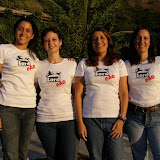


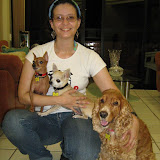
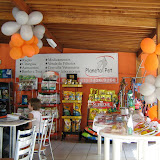

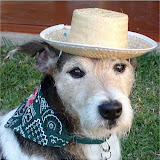


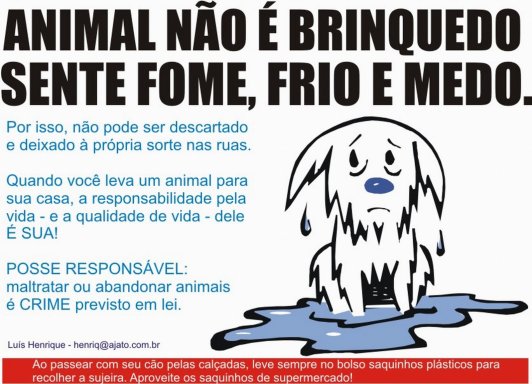%5B2%5D+532.jpg)

Nenhum comentário:
Postar um comentário